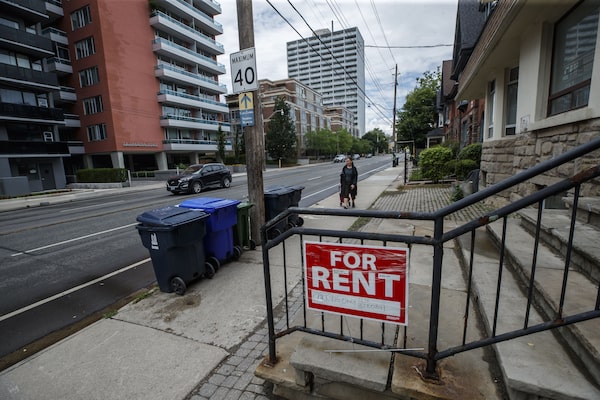
Renters across the country faced record low vacancy rates and record high rent increases in 2023, but Statistics Canada says Toronto and Vancouver residents who don't own their homes face the greatest financial and mental pressures. A 'For Rent' sign is posted outside a home in Toronto, July 12, 2022.Cole Burston/The Canadian Press
Rob Csernyik is a contributing columnist for The Globe and Mail and a 2022 Michener-Deacon fellow.
Recently I saw an ad for roommates come under fire on social media, and it wasn’t hard to see why. In it, a couple sought a roomie who would spend part of each week sleeping at the home of a partner or family member, while still paying a hefty rent.
I couldn’t join in with a snarky barb. The proposal read to me less as diva behaviour than an earnest attempt to balance high rent and having another body in close quarters. Besides, I find little to laugh about in the rental market these days.
Though I’ve been living abroad for nearly two years, I’ve started researching rental prices for my upcoming return to Canada. The results fill me with dread. Studio apartments in Montreal and Saint John now cost nearly double what I paid for similar units in these cities. The rents are technically within my means, though not “comfortably.” I’ll have to take on extra work. Markets like Toronto and Vancouver are out of the question. Their high rents would make multiple roommates a necessity. Been there, done that. No cost savings offsets the inconvenience.
Between 2001 and 2021, the number of Canadian households of non-related roommates grew by 54 per cent, with Statistics Canada citing unaffordability as a key reason. Earlier this year, the Canada Mortgage and Housing Corp. reported rent growth was outpacing wage growth. CMHC also noted lower-income renters have to deal with “below-average vacancy rates for more affordable units in major cities, compounding the affordability challenge.”
Stress Test podcast: Living alone is a luxury in today’s rental market
On the commercial side, the trajectory is different. After countless tales of small businesses closing or struggling with rent hikes, and after the pandemic hollowed out urban cores, it feels like a tipping point for commercial rents might be imminent.
Over the past several weeks, there’s been commercial rent reform chatter in Canada’s two most expensive metro areas. Toronto’s recently released 10-year economic plan proposes introducing commercial rent control for small businesses. Meanwhile, in New Westminster, B.C., a city councillor has been fighting for the same. While we’re on this subject, let’s put in fixes so that comfortably renting apartments solo is once again an option.
Roommates are not a benign cost-saving measure. They are an obstacle to certain lifestyle choices – like having the freedom to buy a pet, work full-time from home or start a family. There’s a point of coming-of-age where you desire the tranquility and comfort of your own space, whether alone, or with a partner. Millennials shouldn’t have to keep living with roommates when rental market reforms are too slow, if not ignored.
There’s also a tacit acceptance of the increasingly strange state of housing options. Stories of landlords turning apartments into defacto rooming houses by renting two beds in a single bedroom don’t seem outrageous anymore.
Another trend, co-living – communal living with multiple residents – is increasingly taking root in major cities, but can require living with double-digit numbers of roommates and sharing bathrooms.
There’s also a camouflaging of the core issues. Tiny homes and lushly appointed vans aren’t merely aesthetic choices, but results of scarce housing options and desires for some relative solitude. Tales of millennials and Gen Z moving in with boomers frequently get framed as feel-good stories, sidestepping the fact that both parties struggle to afford living standards they once took for granted.
There’s no magic wand to wave, but there are tactics which can help keep rents from getting further out of control.
For instance, the Canada’s Housing Plan program, announced earlier this year, includes plans to significantly expand rental stocks by through $15-billion in additional funding for apartment construction loans and partnering with housing providers to build affordable units on underused public lands.
Recently enacted limits on Airbnbs may also help, by freeing up housing to long-term tenants. One McGill University study suggests municipal regulations on short-term rentals saved B.C. renters more than $600-million in rent increases last year.
Residential rent control is another solution. As new units come on the market, those who move in open up listings on lower ends of the rental spectrum. With rent controls to keep prices in check, these units will offer options for more renters and may help us avoid a future where having roommates is no longer a choice.
I expect to spend the next few years on the same no-frills-studio rung of the rental ladder – no different than when I worked for minimum wage. But today’s rental market gives me less space for more money, making it feel like I’m in debtor’s prison.
If I have to choose between a step backward in the housing market, it will be the one where I can live relatively in peace.